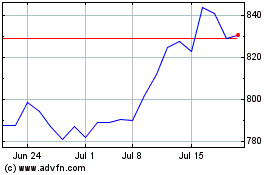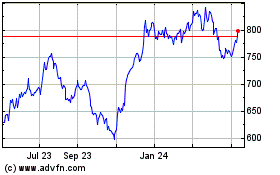BlackRock, Inc. (NYSE: BLK) today announced that 99 percent of
Exchange Traded Funds (ETFs) offered by its iShares® ETF business
are not expected to pay capital gains distributions. iShares is the
largest manager of ETFs. According to preliminary year-end capital
gains information, out of the 233 iShares products, only two -- the
iShares Barclays Aggregate Bond Fund (NYSE Arca: AGG) and the
iShares Barclays Intermediate Credit Bond Fund (NYSE Arca: CIU) --
will have any capital gains distributions and they will be minimal.
Because capital gains distributions are taxable, the ability to
minimize capital gains distributions can represent significant
savings to the investor. Final dividends and tax characteristics
will be available by the end of year.
Tax efficiency has emerged as one of the most distinctive and
valuable attributes of ETFs, given a low return environment where
investors can owe capital gains taxes on top of poor performance,
noted Jennifer Grancio, iShares managing director at BlackRock.
"When every dollar counts, having a tax-efficient portfolio can
be an important factor in investment success," she said. "iShares
ETFs have historically generated relatively few instances of
capital gains distributions -- making them excellent tools for
investors concerned about the impact of taxes on overall investment
performance."
ETFs combine elements of traditional mutual funds and individual
securities. Like index mutual funds, ETFs represent diversified
portfolios of securities that track specific indexes.
Key ETF features can make the vehicle highly tax efficient
compared to both actively managed and index based mutual funds. In
particular, actively managed funds buy and sell stocks throughout
the year, potentially leading to high portfolio turnover and tax
consequences, and investors buy and sell shares through the fund
directly, potentially triggering capital gains for other
shareholders. In contrast, because ETFs track indexes, they have
lower portfolio turnover, which generally leads to fewer taxable
events. In addition, ETF investors buy and sell shares on an
exchange, which insulates them from the impact of transactions by
other shareholders.
Beyond offering access to a naturally tax-efficient structure,
iShares ETFs also offer the advantages of an experienced, dedicated
portfolio management group that works diligently to minimize
capital gains distributions.
"iShares has an established track record in managing for tax
efficiency," Grancio said. "Over the last 10 years, iShares ETFs
have not paid capital gains 99 percent of the time."
----------------------------------------------------------------------------
Fund Estimated Estimated Estimated Approximate Ex-Date Pay
(Ticker) Short-Term Long-Term Total % of NAV Date
Capital Capital Capital
Gains Gains Gains
($/share) ($/share) Distribution
($/share)
----------------------------------------------------------------------------
iShares $0.24- $0.07- $0.31-$0.38 0.29%-0.35% 12/1/11 12/7/11
Barclays $0.29 $0.09
Aggregate
Bond Fund
(AGG)
----------------------------------------------------------------------------
iShares -- $0.03- $0.03-$0.05 0.02%-0.05% 12/1/11 12/7/11
Barclays $0.05
Intermediate
Credit Bond
Fund (CIU)
----------------------------------------------------------------------------
This information represents an estimate of the distribution per
share as of 11/4/11. This estimate does not take into account any
possible tax reclassifications, nor does this estimate contemplate
changes in income or shares outstanding that may occur prior to
record date. This estimate is for informational purposes only.
Please consult your tax professional or financial advisor for more
information regarding your tax situation.
Long Term Distribution Data Illustrates
Potential Advantages
Long term distribution data for active and index mutual funds
compared to iShares products illustrates the tax issue as well as
the potential benefits of selecting tax efficient investment
vehicles.
For the period 2001 to 2010, the 10-year average capital gains
distribution (as a percentage of net asset value) for active U.S.
open-end large growth funds was 1.2 percent; for index funds in the
same category, it was 0.4 percent.(1) By contrast, over the same
period, the average capital gains distribution for the iShares
Russell 1000 Growth Index Fund (IWF) and the iShares S&P 500
Growth Index Fund (IVW) was 0.0 percent.
The contrast has been particularly dramatic in years when
actively managed mutual funds posted especially large capital
gains. In 2007, when open-end mutual funds paid the largest capital
gain distributions on record, just 33 percent of active mutual
funds did not pay capital gains, while 97 percent of iShares ETFs
did not pay capital gains.(2)
"The cost of an investment, including the tax impact, is a
critical factor that shapes the investment's total performance, but
investors don't always closely examine the total costs in
determining whether an investment make sense for them," said
Grancio. "In today's investing environment, it's more critical than
ever for investors to understand how taxes and other costs impact a
portfolio, and take those realities into account in their
investment decision-making."
Tax Cost Often a Missing Piece of the
Investment Discussion
Research recently conducted by iShares suggests financial
advisors might be missing an important opportunity to educate their
clients about tax costs. The research indicated that when investors
and financial advisors together discuss potential investment
opportunities, taxes and other costs are often left out of the
discussion -- even though investors would like to understand these
topics better.
In a survey conducted this summer by iShares among 385 retail
advisors and 394 investors, nearly three quarters of advisors
indicated their clients aren't interested in such discussions, yet
investors overwhelmingly indicated the opposite, with 89% saying
they would be interested. Only a third of advisors indicated they
"always" discuss with clients all the factors, including taxes and
other costs, that affect fund performance, and 12% said they
"never" or "rarely" discuss these factors.
"Advisors and investors together need to be sure to bring costs
such as taxes to the table, as part of a comprehensive focus on
precisely how investment performance is generated, for mutual funds
as well as ETFs," Grancio said. "We believe investors will find
that ETFs offer tax efficiency and other intrinsic advantages that
make ETFs highly worthy additions to a portfolio."
About BlackRock BlackRock is a leader in
investment management, risk management and advisory services for
institutional and retail clients worldwide. At September 30, 2011,
BlackRock's AUM was $3.345 trillion. BlackRock offers products that
span the risk spectrum to meet clients' needs, including active,
enhanced and index strategies across markets and asset classes.
Products are offered in a variety of structures including separate
accounts, mutual funds, iShares® (exchange-traded funds), and other
pooled investment vehicles. BlackRock also offers risk management,
advisory and enterprise investment system services to a broad base
of institutional investors through BlackRock Solutions®.
Headquartered in New York City, as of September 30, 2011, the firm
has approximately 10,200 employees in 27 countries and a major
presence in key global markets, including North and South America,
Europe, Asia, Australia, and the Middle East and Africa. For
additional information, please visit the Company's website at
www.blackrock.com.
About iShares iShares is the global
product leader in exchange traded funds with over 460 funds
globally across equities, fixed income and commodities, which trade
on 19 exchanges worldwide. The iShares Funds are bought and sold
like common stocks on securities exchanges. The iShares Funds are
attractive to many individual and institutional investors and
financial intermediaries because of their relative low cost, tax
efficiency and trading flexibility. Investors can purchase and sell
shares through any brokerage firm, financial advisor, or online
broker, and hold the funds in any type of brokerage account. The
iShares customer base consists of the institutional segment of
pension plans and fund managers, as well as the retail segment of
financial advisors and high net worth individuals.
ETFs and mutual funds each hold baskets of securities. ETFs
trade on exchanges intraday at market price, which may be greater
or less than net asset value. Shares of ETFs are not individually
redeemed from the fund. Transactions in shares of ETFs result in
brokerage commissions and generate tax consequences. Index ETFs are
passively managed; they seek to track a market index, before fees
and expenses, and do not attempt to outperform during rising
markets or to take defensive positions in declining markets. ETF
performance may diverge from the ETF's underlying index. Mutual
funds are accessed directly from the fund company or through a
select broker, pricing generally occurs once a day, and investors
buy or redeem shares at the end-of-day net asset value, less any
applicable fees. Some mutual funds may charge sales loads or
redemption fees. Active mutual funds seek to outperform their
benchmark while the goal of index mutual funds is to track their
index. Consequently, active funds typically charge more than
index-linked products for the increased trading and research
expenses that may be incurred. Mutual funds and ETFs are obliged to
distribute portfolio gains to shareholders.
Carefully consider the funds' investment
objectives, risk factors, and charges and expenses before
investing. This and other information can be
found in the funds' prospectuses, which may be obtained by calling
1-800-iShares (1-800-474-2737) or by visiting www.iShares.com. Read
the prospectus carefully before investing.
Investing involves risk, including possible
loss of principal. Diversification may not protect against
market risk.
Transactions in shares of the iShares Funds will result in
brokerage commissions and will generate tax consequences. iShares
Funds are obliged to distribute portfolio gains to shareholders.
Shares of the iShares Funds may be sold throughout the day on the
exchange through any brokerage account. However, shares may only be
redeemed directly from a Fund by Authorized Participants, in very
large creation/redemption units.
This estimate is for informational purposes only and not
intended to be tax advice. Tax consequences of dividend
distributions may vary by individual taxpayer. Please consult your
tax professional or financial advisor for more information
regarding your tax situation.
To receive a distribution, you must be a registered shareholder
of the fund on the record date. Distributions are paid to
shareholders on the payment date. Past
distributions are not indicative of future distributions.
The iShares Funds ("Funds") are distributed by SEI Investments
Distribution Co. ("SEI"). BlackRock Fund Advisors ("BFA") serves as
the investment advisor to the Funds. BlackRock Fund Distribution
Company ("BFDC") assists in the marketing of the Funds. BFA and
BFDC are affiliates of BlackRock, Inc., none of which is affiliated
with SEI.
Neither BlackRock Institutional Trust Company, N.A., and its
affiliates nor SEI and its affiliates provide tax advice. Please
note that (i) any discussion of U.S. tax matters contained in this
communication cannot be used by you for the purpose of avoiding tax
penalties; (ii) this communication was written to support the
promotion or marketing of the matters addressed herein; and (iii)
you should seek advice based on your particular circumstances from
an independent tax advisor.
The iShares Funds are not sponsored, endorsed, issued, sold or
promoted by Russell Investment Group or Standard & Poor's, nor
are they sponsored, endorsed or issued by Barclays Capital. None of
these companies make any representation regarding the advisability
of investing in the Funds. Neither SEI, nor BlackRock Institutional
Trust Company, N.A., nor any of their affiliates, are affiliated
with the companies listed above.
* Not FDIC Insured * No Bank Guarantee * May
Lose Value
(1) Source: BlackRock, Morningstar as of 12/31/10. Past
distributions are not indicative of future distributions.
(2) Source: Lipper, Morningstar, BlackRock as of 12/10. Past
distributions are not indicative of future distributions.
BlackRock (NYSE:BLK)
Historical Stock Chart
From Apr 2024 to May 2024

BlackRock (NYSE:BLK)
Historical Stock Chart
From May 2023 to May 2024
